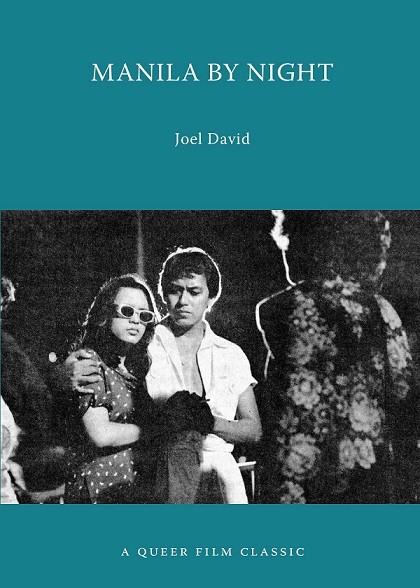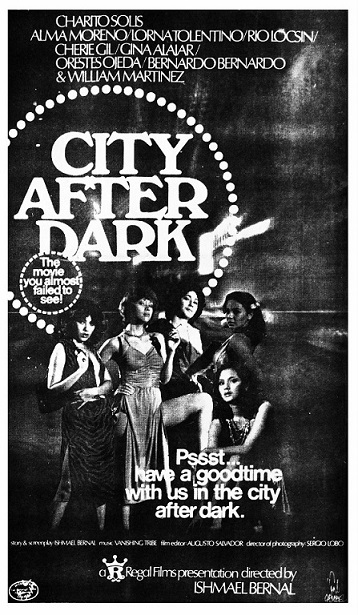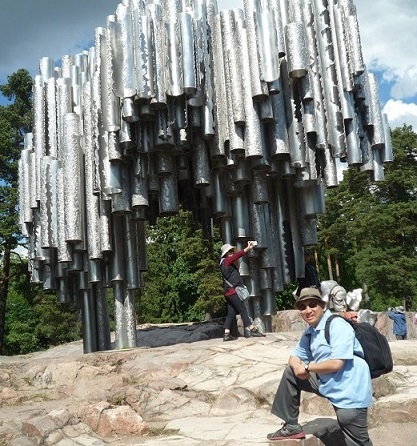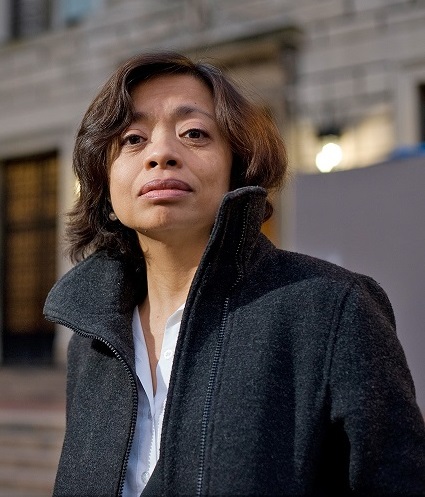Toward the end, a hopeful outlook for the PHL (Part 2)

The author’s book ‘Manila by Night: A Queer Film Classic.’ Bernardo Bernardo and Rio Locsin are shown on the cover.
When contemporary filmmaker Lawrence Fajardo, who has been specializing in the multicharacter film narratives that Bernal pioneered in, opted to return to his theater roots, he picked out a play, Herlyn Gail Alegre’s “Imbisibol,” and cast Bernardo in a role intended for a straight actor. Realizing that the BB’s strengths lay in camp and humor, Fajardo requested him to collaborate in revising and improvising Benjie, a character several steps removed from Manay: older, impoverished, sickly, working overseas as an undocumented laborer, whose only happiness lay in the domestic relationship he shared with his same-sex partner (played in the film by Ricky Davao). When the film version was completed, shot on location in Hokkaido, Bernardo won his second critics prize for performance (the first was of course for “Manila by Night”) – the only actor since Vic Silayan to win in all the instances he was nominated.
In effect, BB was drawing from his experience as a health worker in the U.S., where he had gone into self-exile after enduring stereotyping in his film and TV roles because, ironically, of his triumph with his Manay character. An avowedly queer subject, he had also had, after all, his share of heterosexual romances, including a years-long high-profile affair with Chanda Romero. Younger acquaintances familiar with his occasional cross-dressed socnet pics needed a double-take or two to grasp the full measure of his boundary-busting, genre-challenging, culture-crossing persona, what with some of his female contemporaries admitting to having had crushes on him.
A more direct deduction one could make regarding his facility in various professional capacities is that he was always fully prepared, in practice as well as in theory: his professional record yields an enviable number of academic qualifications, including scholarships and graduate degrees at prominent American universities, as well as faculty stints in U.S. and Philippine educational institutions. During the past couple of years, he would mention work on a memoir as his legacy project, and posted some wonderful little-known anecdotes on his Facebook wall as samples.

In the Ishmael Bernal film, retitled ‘City After Dark,’ Bernardo is cast as Manay Sharon, a gay fashion designer who is the film’s socio-political conscience.
This was about the same time that he came out, as it were, in another sense – in support of the presidential candidacy of Rodrigo Duterte. Such a political stance set him off against several of his friends in literature and the arts. As someone who refused to capitulate to polarized positions, I was able to continue corresponding with him, and saw how his motives were as earnest as when he linked up decades ago with Bernal, Lino Brocka, and the other founding members of the Concerned Artists of the Philippines against the Marcos dictatorship. He read the drafts of the book I was working on (titled “Manila by Night: A Queer Film Classic,” published by Arsenal Pulp Press in Vancouver, where “Manay Revisits ‘Manila by Night’” appears as an appendix), and suggested some helpful changes and corrections.
During the final revision, I informed him that I expanded the book’s conclusion, saying in effect that not only had nothing changed since the Marcos years, but that the plight of the country’s poor had worsened. To drive the point home, I juxtaposed some scenes from “Manila by Night” with drawn-from-headlines photographs of extrajudicial executions, and offered Bernardo the opportunity to revise anything in his interview by way of responding to this harsh indictment of the Philippine political system. He took an unusually long time before he finally replied, on FB Messenger: “I’ve decided not to make a statement regarding the current state of affairs in Manila under the new dispensation. After those years of depression in the U.S., I think it’s healthier for me to cling to a more hopeful outlook. Eyes wide open. [Smile] Love the book, Joel. [Heart] So proud and honored to be a part of it. Maraming, maraming salamat.”
Before we consign Bernardo to a historical past, a few things ought to remind us that he deserves to be around longer. “Manila by Night” remains the only major Filipino film still awaiting restoration and the memoir he left behind still has to be published. FACINE also recently announced that he’ll be the first posthumous awardee of their Golden Harvest prize – an indication that when BB left, he made sure we would all be enriched by his presence.
Joel David is Professor for Cultural Studies at Inha University in Korea and was founding Director of the University of the Philippines Film Institute. His archival blog, Amauteurish! contains digital editions of his books and articles on Philippine cinema, as well as the complete Facebook Messenger exchanges between him and Bernardo. David wishes to acknowledge the assistance of Sari Dalena and Ina Cosio Avellana for providing additional materials for this writeup.












